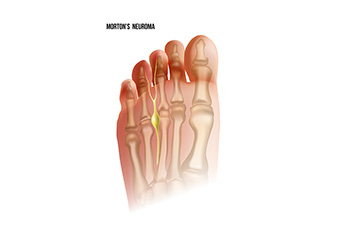
Recovery from Morton's neuroma surgery typically involves a gradual process that emphasizes rest and rehabilitation. Initially, patients may need to keep weight off the foot for a few days to reduce swelling and discomfort. By the end of the first week, many can begin gentle range-of-motion exercises to promote flexibility. After two to four weeks, most individuals can gradually reintroduce weight-bearing activities, but high-impact exercises should be avoided until cleared by a podiatrist. Strengthening exercises can be incorporated around the four to six-week mark, focusing on improving stability and muscle support. Wearing appropriate footwear is critical during recovery to ensure comfort and prevent further irritation. If you have Morton's neuroma, it is strongly suggested that you consult a podiatrist who can determine if this type of foot surgery is right for you.
Morton’s neuroma is a very uncomfortable condition to live with. If you think you have Morton’s neuroma, contact one of our podiatrists of Palmetto Podiatry Group of Anderson. Our doctors will attend to all of your foot care needs and answer any of your related questions.
Morton’s Neuroma
Morton's neuroma is a painful foot condition that commonly affects the areas between the second and third or third and fourth toe, although other areas of the foot are also susceptible. Morton’s neuroma is caused by an inflamed nerve in the foot that is being squeezed and aggravated by surrounding bones.
What Increases the Chances of Having Morton’s Neuroma?
- Ill-fitting high heels or shoes that add pressure to the toe or foot
- Jogging, running or any sport that involves constant impact to the foot
- Flat feet, bunions, and any other foot deformities
Morton’s neuroma is a very treatable condition. Orthotics and shoe inserts can often be used to alleviate the pain on the forefront of the feet. In more severe cases, corticosteroids can also be prescribed. In order to figure out the best treatment for your neuroma, it’s recommended to seek the care of a podiatrist who can diagnose your condition and provide different treatment options.
If you have any questions, please feel free to contact our office located in Anderson, SC . We offer the newest diagnostic and treatment technologies for all your foot care needs.
